Shovrim Shtika - Breaking the Silence 15 July 2004
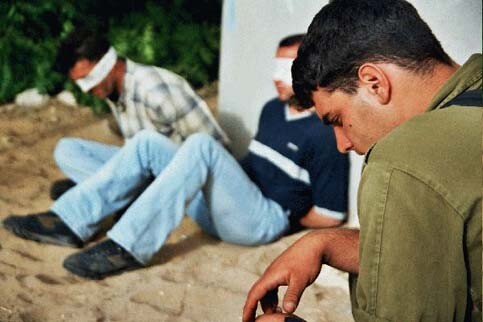
Two blindfolded Palestinians sit while guarded by an IDF soldier (Image: www.shovrimshtika.org)
Closing a school, abusing civilians at a check point, following orders, staying in a family’s comandeered home, posing for trophy photos with enemy bodies, being the law, enjoying power, feeling ashamed, getting addicted to controlling people, dispersing a funeral, wanting to forget, not caring, the ease in which you actually do whatever you want to do unsupervised, the unbearable lightness of these things that happen. 12,643 words of testimonies.
What follows is a compilation of testimonies by IDF soldiers who served until recently, or are still actively serving, in the West Bank city of Hebron. The testimonies were gathered by five of the soldiers, and this is what they write:
Recently, we were released from active military duty. Hebron was the hardest, most confusing place we served. Until now, each of us dealt with the difficult things we saw there on our own. Our photo albums - souvenirs from the time we spent in Hebron - have remained, until now, sealed on our respective bedroom shelves. Since we were released, we came to realize that these memories are common to all the guys who served alongside us. We decided to speak out. We decided to tell our stories. Hebron is not on another planet; it’s an hour’s drive from Jerusalem. But Hebron is light years from Tel Aviv. So we decided to bring Hebron to Tel Aviv. Now, its up to you to come, look, and listen. To understand what’s going on there.
The testimonies of dozens of soldiers were captured on video and presented alongside photographs of the town taken by the soldiers themselves, in an exhibit which recently closed in Tel Aviv, but is soon to open in various other sites around the country: Breaking the Silence - Shovrim Shtika.
Testimonies page 1:
First week, first time at the checkpoint, at the passage between the Palestinian area and the street where only Jews can go. You need to have a fence. Those guys, they have to stop, there’s a line, then they hand you their ID cards through the fence, you check them, and let them through.
There was this guy with me who… We’d just finished advanced training, got to the assignment and he yells, “Waqif! Stop!” The man didn’t quite understand and advanced one more step. One extra step, and then he yells again, “Waqif!” and the man freezes in fear. He didn’t quite understand what the soldier said. Actually, it’s a procedure nobody pays attention to, stopping them exactly on the line. So he decided that because the guy made this one extra step… they should obey us, therefore he’ll be detained. I said to him, “Listen, what are you doing?” he said, “No, no, don’t argue, at least not in front of them, what are you doing, I’m not going to trust you anymore, you’re not reliable”… Eventually one of the patrol commanders came over, came from up there, and I spoke to him. I said, “Listen, what’s the deal, how long do you want to detain him for?” He said, “Listen, you can do whatever you want, whatever you feel like doing. If you feel there’s a problem with what he’s done, if you feel something’s wrong, even the slightest thing, you can detain him for as long as you want.” And then I got it, a man who’s been in Hebron one week, it has nothing to do with rank, he can do whatever he wants. He had been there a week, he was hardly even there, like… Really, he had no idea what was going on there, he didn’t have a clue! He’d been there a week! But everyone can do whatever they want, it’s like there are no rules, everything is permissible.
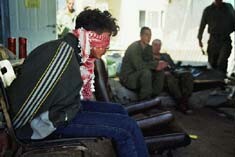
Israeli soldiers look on while a Palestinian detainee sits blindfolded (Image: www.shovrimshtika.org)
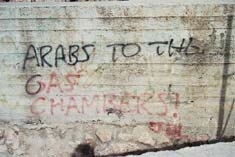
Graffiti in Hebron reads, “Arabs to the gas chambers” (Image: www.shovrimshtika.org)
Another thing I remember from Hebron, something particularly strange, was this so-called “grass widow” procedure, a house the army had taken over and turned into an observation post, the home of a Palestinian family… Not a family of terrorists or anything like that, just a family whose home made a good observation post, so the army evicted them from the house and took it over. Now, when I arrived at this “grass widow”…
Q: how long has the army been there?
A long time, I don’t know, since before we got there, we stayed there for months, I’m sure the house was taken over before that, and held long after that. It’s not just the family who lived in this specific house who were evicted, but also the people living downstairs were evicted, to keep the area sterile for the army, for the sake of this post…
Q: That is to say, it’s been two years now that this Palestinian family has been kept from living in its house.
Yes, that’s it, so conceptually this was a really crazy thing, you’re in somebody’s house, and you climb the stairs of a building, everything is littered with shit, cartridges and glass on the stairs, so you can hear if anyone is approaching. It’s simply a house covered in camouflage netting so people can’t see what you’re doing inside. You simply find yourself in a Palestinian neighborhood, in some family’s home, and it’s totally surreal, because there you are, sitting in the living room, listening for people coming to attack you. That’s it. And through the window you can watch people walking in the street by their home, and the Jewish cemetery is just a few steps away, sometimes you can see Jews coming to the cemetery, to the cemetery area, and sometimes there are Arabs wandering in the area, this was one of the strangest things I’ve ever seen. There was also food left behind, there was a TV, we weren’t allowed to turn it on, this would be too much, this would be considered “bad occupation,” using their electricity…
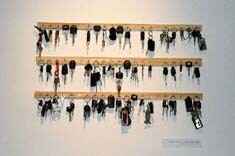
An installation of Israeli-confiscated Palestinian car keys (Image: www.shovrimshtika.org)
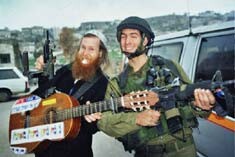
An Israeli soldier and a Jewish settler get chummy in Hebron (Image: www.shovrimshtika.org)
They used to send us to do guard-duty near the battalion headquarters, in Harsina. It was Friday night, and the auxiliary company came up against a terrorist cell, the auxiliary company was also stationed in Harsina, they eliminated two terrorists, killed two terrorists. Friday night dinner was, of course, a very happy affair, two terrorists exterminated, it was on the news, well-publicized in the media, the whole base was jumping. As I was leaving dinner, an armored ambulance arrived with the terrorists’ corpses, and the sight which was revealed to me just after this delicious meal, was of two terrorists’ corpses being held up in a standing position by three people who were posing for photographs. Even I was shocked by this sight, I closed my eyes so as not to see and walked away, I really didn’t feel like looking at terrorists’ corpses. I think your judgment gets a little impaired when everyday… when your enemy is an Arab or somebody else who in your eyes… like, you don’t look at him as a person standing in front of you, but as the enemy, and this is the word for him: enemy. He is not a dog, he is not some animal, you don’t think of him as inferior, he simply doesn’t count. Period. He is not… he is your enemy, and if he’s the enemy, you kill him. And if it’s him that you kill, once you’ve killed him, then it seems that there’s nothing worse you can do to him, but apparently there is.
Army routine during curfew, if that’s what you mean, is simply standing… if you are in a fixed post it means standing there and shouting, “Waqif, ta`al jib al-hawiyya” [Stop, come give me your ID card] there’s a curfew, go home, this is it more or less it, and saying, “I don’t care, I don’t care. No, no, no,” the word we used the most was “No.” If in the beginning we used to speak with them and tried to understand, what happened was that they “passed us off.” A child arrives, you tell him “Listen, I’ll let you pass now, but do me a favor and go home,” and five minutes later he’s back. Then you tell him, “Listen here, you said you’d go, now get lost,” and two months later, I think it’s enough, you don’t need a year, a month is enough, a week is enough for you to get fed up with this child and with all these people, you are on eight-hour guard duty, and you are so tired, and so bummed, and so burnt out and you don’t give a fuck about any of this shit, and then a person comes, and you don’t care if he’s old, if he’s a man, a woman, an adult, a kid, you don’t give a damn what species, race, or color he is, he arrives and you tell him “La, ruh `al beit” [No, go home]. You tell him “turn around and go home.” I’m not interested in any excuses, I’m not interested in anything. You want to buy vegetables? What do I care about your vegetables. There’s a curfew? Period. You don’t move. Your house is in the other direction? I don’t care, find another way, you can’t pass from here.
Our job was to stop the Palestinians at… checkpoint and tell them they can’t pass there anymore. Maybe a month ago they could, but now they can’t. And we knew there was another way they could pass, so on the one hand we were not allowed to let them pass, and on the other hand there were all these old ladies who had to pass to get to their homes, so we’d point in the direction of the opening through which they could pass without us noticing. It was an absurd situation, we couldn’t say “we, the soldiers, did that.” Our officers also knew about this opening. Like, they told us about it. Nobody really cared about it. It made us wonder what we were doing at the … checkpoint. Why was it forbidden to pass? It was really a form collective punishment. Any terrorist could know about and pass through the opening. It was just a form of collective punishment. You’re not allowed to pass because you’re not allowed to pass. If you want to commit a terrorist attack, turn right there and then left, but if you do not want to commit a terrorist attack you’ll have to make a very big detour or you won’t get there at all, which was really brilliant …
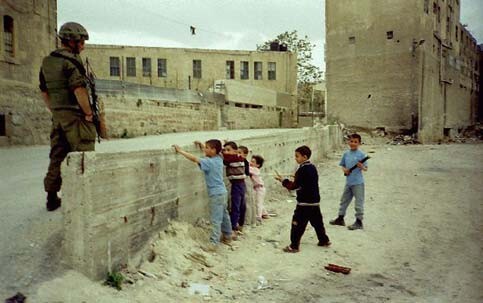
Palestinian kids mimic Israeli soldiers arresting Palestinian adults (Image: www.shovrimshtika.org)
Were I to divide it into percentages, I’m fairly certain that 80 percent of the time there was a curfew, that is, at first there was no curfew, and then it became a permanent situation. There was a day here and a day there without it, mostly during the Hudna [ceasefire] there was a two-week respite. Also, there were these strange decisions that gave you the impression that there was somebody sitting in some office who would ease things up a bit. Sometimes there’s curfew. .. we had a long period of curfew from six till six, or from eight till twelve. Then, out of the blue, curfew from eight till noon and that’s it, back to the routine. Close all the stores, send everybody home, then let them re-open.
Q: When you say “close the stores,” where exactly in Hebron did you happen to come along and close a row of stores?
In the main street of the Casaba, always. At some point it became very easy, there were no more stores left.
Q: And when there were, how did it go?
“Sakir, sakir, sakir, sakir, sakir, sakir, sakir” [close!] making the rounds, reaching the end of the street, going back, one more round, and that’s it, everything would be closed, not a living soul in sight. On a crowded street, with the skills the IDF has today, ten minutes.
I was ashamed of myself the day I realized that I simply enjoy the feeling of power. I don’t believe in it: I think this is not the way to do anything to anyone, surely not to someone who has done nothing to you, but you can’t help but enjoy it. People do what you tell them. You know it’s because you carry a weapon. Knowing that if you didn’t have it, and if your fellow soldiers weren’t beside you, they would jump on you, beat the shit out of you, and stab you to death — you begin to enjoy it. Not merely enjoy it, you need it. And then, when someone suddenly says “No” to you, what do you mean no? Where do you draw the chutzpah from, to say no to me? Forget for a moment that I actually think that all those Jews are mad, and I actually want peace and believe we should leave the territories, how dare you say no to me? I am the Law! I am the Law here! And then you sort of begin to understand that it makes you feel good. I remember a very specific situation: I was at a checkpoint, a temporary one, a so-called strangulation checkpoint, it was a very small checkpoint, very intimate, four soldiers, no commanding officer, no protection worthy of the name, a true moonlighting job, blocking the entrance to a village. From one side a line of cars wanting to get out, and from the other side a line of cars wanting to pass, a huge line, and suddenly you have a mighty force at the tip of your fingers, as if playing a computer game. I stand there like this, pointing at someone, gesturing to you to do this or that, and you do this or that, the car starts, moves toward me, halts beside me. The next car follows, you signal, it stops. You start playing with them, like a computer game. You come here, you go there, like this. You barely move, you make them obey the tip of your finger. It’s a mighty feeling. It’s something you don’t experience elsewhere. You know it’s because you have a weapon, you know it’s because you are a soldier, you know all this, but its addictive. When I realized this … I checked in with myself to see what had happened to me. That’s it. And it was a big bubble that burst. I thought I was immune, that is, how can someone like me, a thinking, articulate, ethical, moral man — things I can attest to about myself without needing anyone else to validate for me. I thought of myself as such. Suddenly, I notice that I’m getting addicted to controlling people.
Related Links
To contribute testimony to the traveling exhibition, contact: yehuda@shovrimshtika.org or leave a message at: 068-454725. To arrange meetings and gatherings in public halls as well as in private houses: leave a message at: 068-454725, or visit: www.shovrimshtika.org To give financial contributions: Bank Hapoalim, Account Number 315451, Branch 608. Cheques should be made out to “Breaking the Silence” and may also be posted to POB 68150, Jerusalem 91681.